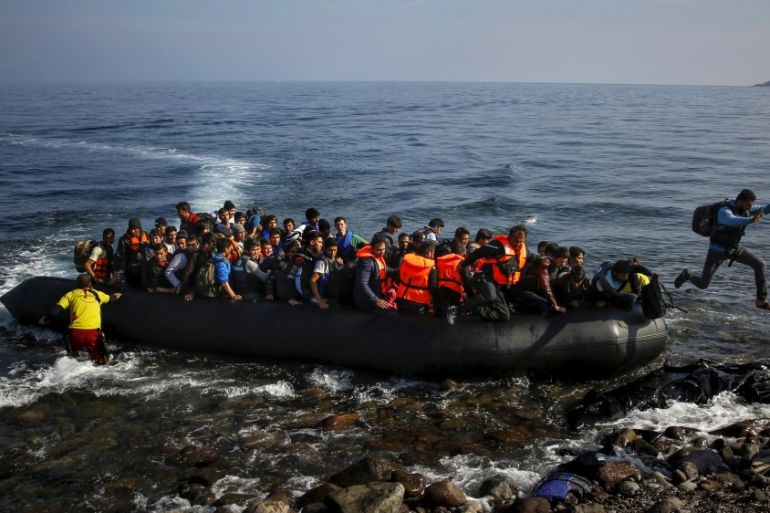Rights groups slam Greece’s decision to ignore refugee ruling
More than 20 groups issue statement condemning government’s move to overturn ruling allowing freedom for new arrivals.

Human rights organisations and aid groups have slammed the Greek government’s decision to defy a court ruling to “end its abusive policy” of containing refugees and migrants on islands.
On Tuesday, 21 groups issued a joint statement condemning the government’s move to overturn a court ruling allowing newly-arrived refugees and migrants to move from the islands to mainland Greece.
Keep reading
list of 4 itemsUN report charts lethal cost of migration over past decade
Conflict, climate, corruption drive Southeast Asia people trafficking: UN
Bodies of three Rohingya found as Indonesia ends rescue for capsized boat
Describing the restrictions on movement as a “containment policy”, the NGOs said the measure “raises rule of law concerns”.
Among the groups that published the statement were Human Rights Watch, Greek Helsinki Monitor, EuroMed Rights, Lesbos Legal Centre, Oxfam and Solidarity Now, among others.
On April 17, the Council of State, Greece’s highest administrative court, ruled that there was no legal justification for barring asylum seekers from moving from the increasingly overcrowded refugee camps on Greek islands to the country’s mainland.
Three days later, however, the director of asylum services issued an order reinstating the restrictions of freedom of movement for asylum seekers. On Monday, parliament began discussing a bill drafted to formalise the restrictions.
In Tuesday’s statement, the rights groups and aid organisations said: “there is no evidence that lifting the containment policy would be a pull factor, as Greece and others claim, especially given the largely closed borders along the Western Balkan migration route into Western Europe”.
“Containing asylum seekers on the Greek islands in substandard and appalling conditions that violate their rights and Greece’s international obligations cannot be justified for migration control purposes,” the statement said.
Upwards of 15,000 refugees and migrants are currently stranded on the Greek islands, from which they cannot leave without permission from the authorities. The islands have seen growing tensions, including racist attacks.
On Tuesday, Migration Minister Dimitris Vitsas downplayed concerns about conditions on the islands hosting asylum seekers.
“I’m not scared about the islands because we know what we have to do. What is really worrisome is the huge increase through Evros,” he said, as reported by the Greek daily Ekathimerini.
‘Burn them alive’
On Sunday night, hundreds of far-right demonstrators swarmed Sapphous Square in Mytilene, the capital of Lesbos Island, and attacked a group of refugees who had been occupying the square for several days.
Yelling “burn them alive” and other violent threats, the assailants threw rocks, bottles and flares at the asylum seekers.
Police intervened, but at least 10 people were hospitalised with injuries by the time the incident came to an end.
More than 100 people were arrested.
The following day, police forcibly transferred the protesting refugees and migrants back to Moria, an overcrowded camp where living conditions have prompted widespread criticism from rights groups and monitors.
Spiros Galinos, the mayor of the island, subsequently published a statement blaming the Syriza-led government for the violence.
“Despite repeated requests from every level, but also desperate cries for help over the Sapphous Square protest, including amid fears of a reaction stemming from the local community’s fear, the government’s persistent lack of action resulted in yesterday’s events,” Galinos said.
The mayor went on to say that “the responsibility for what happened lies exclusively with the government and the way it has for months handled the situation on the islands”.
According to the United Nations refugee agency (UNHCR), at least 7,497 refugees and migrants have reached Greece so far this year.
While many make the treacherous journey by boat across the Mediterranean Sea, an increasing number of people have entered Greece by crossing the country’s land border with Turkey.